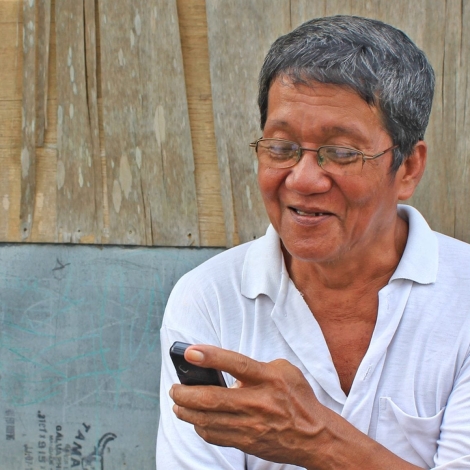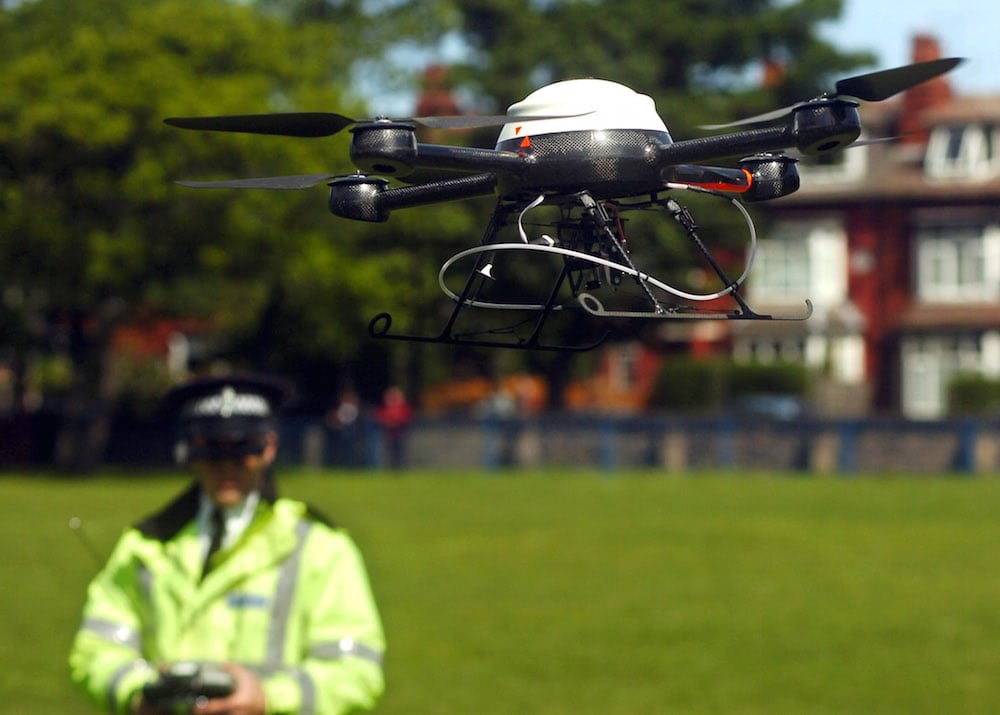Ben and Joy dip into their box of cash and jewelry to pay for emergencies like dengue fever-induced medical bills and a nephew’s school expenses. Meanwhile, Juan and Ana next door struggle with a burgeoning addiction to cockfight gambling, and Pep and Rita nearly lose their business when a falling mango tree narrowly misses their cart. The solution to everyone’s problems is the same: make measured financial decisions. Save money, spend it wisely and insure your valuables.
The couples are soap opera characters created for an educational campaign by the humanitarian organization Mercy Corps. Their fictitious issues were calculated to teach financial lessons to 20,000 rural Filipinos who had lost most of their belongings in Typhoon Haiyan. But Ben and Joy and rest did not broadcast through TVs or radios. Instead, their drama took place on phones through texts and calls.
Mercy Corps recorded and delivered episodes using a unique tool built by the non-profit EngageSPARK. And because the campaign took place on phones, the education was a two-way street. The collaboration earned a GSMA 2015 Global Mobile Award, and now the two organizations are taking lessons they learned from the Filipino soaps to other disaster-prone communities, conflict and crisis zones around the world.
At first glance, this is a story of the power of a good story. But behind the curtain, this is the story of a communications tool. With engageSPARK’s system, Mercy Corps taught lessons to a large group of people, and after each episode surveyed them to gauge comprehension and gain deeper understanding of the obstacles that keep people from saving and investing. The answers informed the rest of the campaign and the tool allows for quick changes from one episode to the next.
Avner Mizrahi at engageSPARK demonstrates the tool in this E4C Webinar.
After Haiyan, the humanitarian organization Mercy Corps had opened bank accounts for 25,000 typhoon victims, funding them with 4030 pesos, roughly US$85, transferred in three installments. Along with the money, the organization also wanted to instill some financial wisdom. The recipients earned an average of $2 per day. If they saved money at all, some of them kept it in their homes in so-called bamboo banks, the cavity in a piece of bamboo or some other container. And many of those savings were lost in the flood. Most had never used a bank or considered long-term financial planning.
“In focus groups… people said that they know they should do this but they didn’t really grasp why they should be doing these things,” Vaidehi Krishnan told E4C. Krishnan is the former head of Mercy Corps’ program in the Philippines and is now in the Middle East working on Mercy Corps’ response to Syria.
Running with the soap opera idea, the organizations sent 22 episodes in more than 844,000 text messages and automated calls to 20,000 of the people who received Mercy Corps’ bank deposits. Responses suggested that the soaps were a hit among those who read or listened to them.
“It was a fun couple of weeks recording those things. We tested some of the messages on our security guards and maids in the office to find out what they thought,” Krishnan says.
Women, especially, seemed to enjoy the stories.
“We were doing one or two a week and women asked us if we could do more because they wanted to know what was happening in the lives of this couple,” Krishnan says.
Find scripts of some of the episodes in links here.
By the numbers
Mercy Corps is diligent about assessing impact, and engageSPARK’s platform is digital, capable of serving up the numbers that the term implies. A glance at the data suggests that there may have been an impact. And Mercy Corps plans deeper testing through future campaigns.
Of the 20,000 people included in the program in the Philippines, 1200 received automated calls. The calls were more expensive at $0.30 per episode compared to $0.10 per episode by text message. But the calls had a 10-fold higher response rate: 48.2 percent compared to just 4.5 percent of the texts.
Mercy Corps performed a randomized, controlled trial in a subset of the program participants. They found that 17 percent said that they had received automated calls, and they were more than twice as likely to save money and use banking services compared to the rest.
There was also a spike in bank transactions after each soap campaign. But it’s not clear if that was coincidental or actually a result of their work.
“I won’t say that we had a very large number of people. We had a small number of people continuously using their accounts. But both times that we saw a jump in transaction data around the time that we ran the campaigns. We need to go in and see if there actually is a correlation,” Krishnan says.
Wait, press what?
Automated calls were new to many of the people the campaign targeted. These are the same kinds of calls that deliver news about cruise prices and school snow days in Western countries, but they had not yet arrived on phones in the rural Philippines.
“On the first call, only 10 – 15 percent of the respondents actually pressed a key. And it turned out that the way they were describing that they should press a key was flawed. The idea of pressing a key while you’re on a phone call was different and new, so they had to clarify what they wanted them to do,” Avner Mizrahi at engageSPARK says.
After changing the phrasing and adding a feature that repeats the instructions if no action is taken, response rates increased from 15 percent to 48.5 percent.
That’s one example of why testing is crucial for a campaign, Mizrahi says.
As the campaign rolled on and people answered questions about the episodes, the Mercy Corps team responded by changing the story lines.
“If people gave wrong answers to multiple choice questions then they knew that they had to make a change,” Krishnan says.
Soaps international
engageSPARK has taken the concept to Papua New Guinea, where it is mounting a “big, big” HIV awareness soap opera with Population Services International, Mizrahi says.
And Mercy Corps is working again with engageSPARK on an investment awareness campaign in Afghanistan.
Not every campaign is a soap opera, but the data collection tools will be important.
“We’d like engageSPARK to help us make our programs more adaptive [as they did in the Philippines]. Adapt the programs to the changing context. If they don’t adapt in real time we could be completely off and not know it,” Krishnan says.

